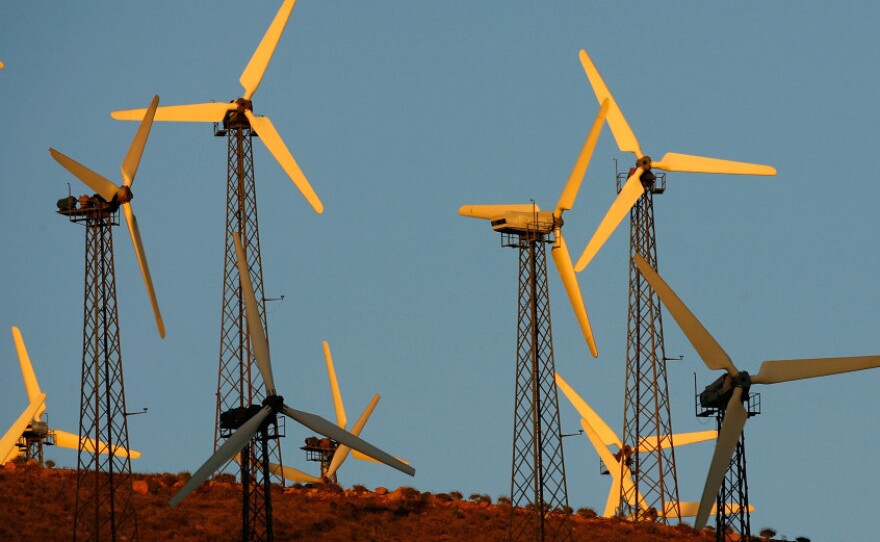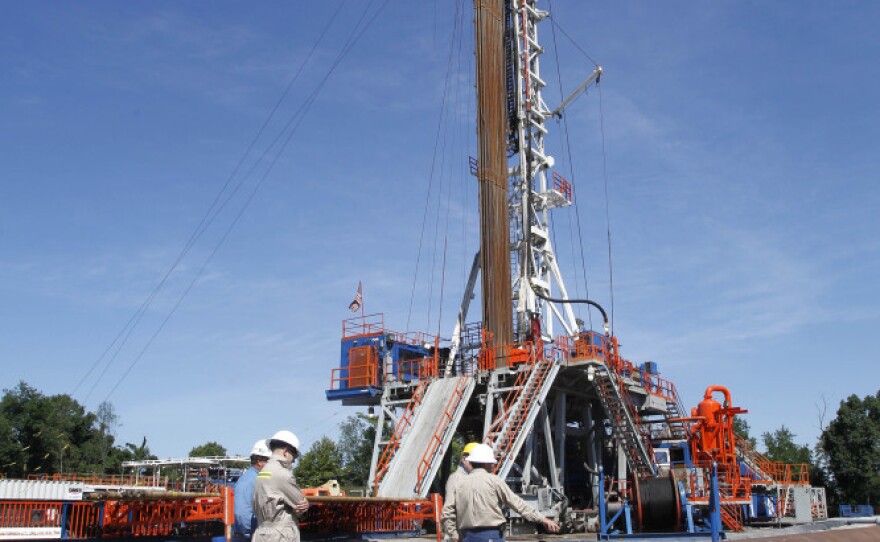The boom in cheap natural gas in this country is good news for the environment, because relatively clean gas is replacing dirty coal-fired power plants. But in the long run, cheap natural gas could slow the growth of even cleaner sources of energy, such as wind and solar power.
Natural gas has a bad rap in some parts of the country, because the process of fracking is not popular. But many people looking at cheap natural gas from the global perspective see it as a good thing.
Henry Jacoby, an economist at the Center for Energy and Environmental Policy Research at MIT, says cheap energy will help pump up the economy.
"Overall, this is a great boon to the United States," he says. "It's not a bad thing to have this new and available domestic resource." He says cheap energy can boost the economy, and he notes that natural gas is half as polluting as coal when it's burned for electricity.
"But we have to keep our eye on the ball long-term," Jacoby says. He's concerned about how cheap gas will affect much cleaner sources of energy. Wind and solar power are more expensive than natural gas, and though those prices have been coming down, they're chasing a moving target that has fallen fast: natural gas.
"It makes the prospects for large-scale expansion of those technologies more chancy," Jacoby says.
Natural Gas: 'A Bridge To Nowhere'?
From an environmental perspective, natural gas could help transition our economy from fossil fuels to clean energy. It's often portrayed as a bridge fuel to help us through the transition, because it's so much cleaner than coal and it's abundant. But Jacoby says that bridge could be in trouble if cheap gas kills the incentive to develop renewable industry.
Long-term renewable deployment in the U.S. is going to depend primarily on policy. Is there enough concern about environmental consequences to put in place incentives for renewable energy?
"You'd better be thinking about a landing of the bridge at the other end. If there's no landing at the other end, it's just a bridge to nowhere," he says.
In the short run, at least, the wind industry isn't too worried about this. Denise Bode, who heads the American Wind Energy Association, says low gas prices don't undercut current prices for wind, because those are mostly fixed by 20-year contracts, not market prices.
And even if wind is a bit more expensive than natural gas, she says utilities still want it in their mix. Windmills aren't subject to changing fuel prices, so the cost of production is quite predictable. That's not true for natural gas — there's no guarantee that today's cheap prices will stay as low as some predict.
"It's very difficult to really know how certain that is, so you always want to balance that with something that is certain," Bode says.
Reducing Political Will For Renewables?
What really worries her isn't natural gas — it's politics. Wind could lose a huge tax break at the end of this year. And that would have a much more dramatic effect than low natural gas prices.

"You'll see very low numbers" for new wind installations if the federal production tax credit expires," Bode says. "In fact, I think EIA [the U.S. Energy Information Administration] projects almost zero for 2013."
The solar industry's subsidies run for several more years, so they are not in that bind, at least not yet. But Trevor Houser, an energy analyst at the Rhodium Group, says these tax credits and other incentives like state renewable standards are key if renewables are to grow and mature during the natural-gas glut.
"Long-term renewable deployment in the U.S. is going to depend primarily on policy," Houser says. "Is there enough concern about environmental consequences to put in place incentives for renewable energy?"
That partly depends on how much of a premium people and companies will be willing to pay for cleaner energy. Right now, with natural gas so cheap, that premium is fairly substantial.
"If those prices hang around for another three or four years, then I think you'll definitely see reduced political will for renewable energy deployment, " Houser says. "But we don't expect prices that low to hang around that long, because low prices are in many ways self-correcting."
Gas is so cheap now that companies that produce it are struggling to make a profit. So Houser expects prices to move up. That will help close the price gap between gas and renewable energy.
Even so, there's still a huge way to go before prices and government policies do enough to significantly reduce emissions of the gases that contribute to global warming.
Copyright 2022 NPR. To see more, visit https://www.npr.org. 9(MDAzMjM2NDYzMDEyMzc1Njk5NjAxNzY3OQ001))







